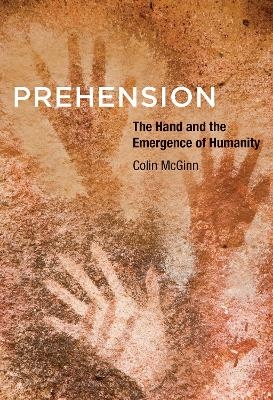
Prehension
The Hand and the Emergence of Humanity
Seiten
2015
MIT Press (Verlag)
978-0-262-02932-2 (ISBN)
MIT Press (Verlag)
978-0-262-02932-2 (ISBN)
- Titel ist leider vergriffen;
keine Neuauflage - Artikel merken
In praise of the hand: A philosopher considers the crucial role of the hand in human evolution, particularly with respect to language.
"McGinn is an ingenious philosopher who thinks like a laser and writes like a dream."
-Steven Pinker
This book is a hymn to the hand. In Prehension, Colin McGinn links questions from science to philosophical concerns to consider something that we take for granted: the importance of the hand in everything we do. Drawing on evolutionary biology, anatomy, archaeology, linguistics, psychology, and philosophy, among other disciplines, McGinn examines the role of the hand in shaping human evolution. He finds that the development of our capacity to grasp, to grip, to take hold (also known as prehension) is crucial in the emergence of Homo sapiens.
The human species possesses language, rational thought, culture, and a specific affective capacity; but there was a time when our ancestors had none of these. How did we become what we so distinctively are, given our early origins? McGinn, following Darwin and others, calls the hand the source of our biological success. When our remote ancestors descended from trees, they adopted a bipedal gait that left the hands free for other work; they began to make tools, which led to social cooperation and increased brain capacity. But McGinn goes further than others in arguing for the importance of the hand; he speculates that the hand played a major role in the development of language, and presents a theory of primitive reference as an outgrowth of prehension.
McGinn sings the praises of the hand, and evolution, in a philosophical key. He mixes biology, anthropology, analytical philosophy, existential philosophy, sheer speculation, and utter amazement to celebrate humans' achievement of humanity.
"McGinn is an ingenious philosopher who thinks like a laser and writes like a dream."
-Steven Pinker
This book is a hymn to the hand. In Prehension, Colin McGinn links questions from science to philosophical concerns to consider something that we take for granted: the importance of the hand in everything we do. Drawing on evolutionary biology, anatomy, archaeology, linguistics, psychology, and philosophy, among other disciplines, McGinn examines the role of the hand in shaping human evolution. He finds that the development of our capacity to grasp, to grip, to take hold (also known as prehension) is crucial in the emergence of Homo sapiens.
The human species possesses language, rational thought, culture, and a specific affective capacity; but there was a time when our ancestors had none of these. How did we become what we so distinctively are, given our early origins? McGinn, following Darwin and others, calls the hand the source of our biological success. When our remote ancestors descended from trees, they adopted a bipedal gait that left the hands free for other work; they began to make tools, which led to social cooperation and increased brain capacity. But McGinn goes further than others in arguing for the importance of the hand; he speculates that the hand played a major role in the development of language, and presents a theory of primitive reference as an outgrowth of prehension.
McGinn sings the praises of the hand, and evolution, in a philosophical key. He mixes biology, anthropology, analytical philosophy, existential philosophy, sheer speculation, and utter amazement to celebrate humans' achievement of humanity.
Colin McGinn has taught philosophy at institutions of higher learning including University College London, Rutgers University, and Oxford University. He is the author of The Character of Mind, Consciousness and Its Objects, The Meaning of Disgust, Philosophy of Language: The Classics Explained, Inborn Knowledge: The Mystery Within, Prehension: The Hand and the Emergence of Humanity (the last three published by the MIT Press), and other books.
| Reihe/Serie | Prehension |
|---|---|
| Verlagsort | Cambridge, Mass. |
| Sprache | englisch |
| Maße | 137 x 203 mm |
| Themenwelt | Geisteswissenschaften ► Philosophie |
| Naturwissenschaften ► Biologie ► Evolution | |
| Naturwissenschaften ► Biologie ► Humanbiologie | |
| Sozialwissenschaften ► Soziologie | |
| ISBN-10 | 0-262-02932-4 / 0262029324 |
| ISBN-13 | 978-0-262-02932-2 / 9780262029322 |
| Zustand | Neuware |
| Haben Sie eine Frage zum Produkt? |
Mehr entdecken
aus dem Bereich
aus dem Bereich
Wie die Vernichtung der Arten unser Überleben bedroht - Der …
Buch | Softcover (2023)
Penguin (Verlag)
CHF 20,95


